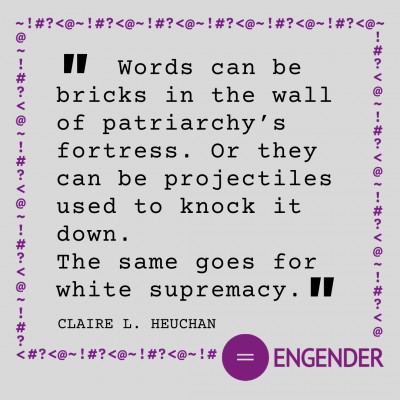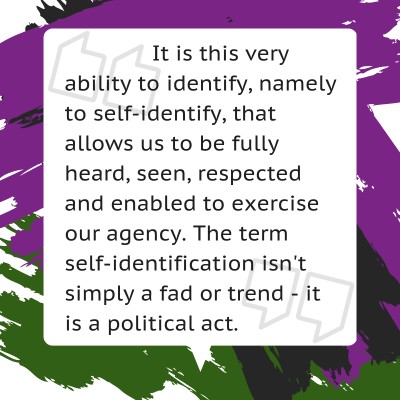Engender blog
GUEST POST: Mainstreaming ambition
Louise Macdonald, OBE, is the co-chair of the First Minister's National Advisory Council on Women and Girls. The focus of the Council this year is 'gender architecture', a key part of mainstreaming gender. To mark the launch of our report What Works for Women: improving gender mainstreaming in Scotland, we asked Louise to blog for us on the work of the council during 2020.
Making gender inequality a historical curiosity is an ambitious vision – but sadly a necessary one.
The First Minister’s National Advisory Council on Women and Girls was established by Nicola Sturgeon in 2017 to help achieve that – with the aim of offering her insight and advice on how to tackle gender inequality at a systemic level.
The issues that the members of our NACWG Circle raised at our inaugural event that year were not new – we listened carefully to what they told us and designed our initial three year strategy to strategically address these issues through a whole-systems lens.
F-words: Beyond a buzzword
This F-words blog from Talat Yaqoob shares why intersectionality must be much more than just a word. Talat is a freelance consultant specialising in gender equality, intersectionality, education and workplace equality, and political participation. Follow her on Twitter @TalatYaqoob.
-1596711527-400.png)
Across policy making, activist movements and the third sector the term “intersectionality” is becoming better known, or at the very least being heard more. However, the term is not new.
Coined in 1989 by Kimberlé Crenshaw, a prominent Black feminist and anti-racist academic, intersectionality was developed as a way to express the compounding and interlocking discriminations that women can face. Crenshaw used the term to explain how both the feminist movement and the anti-racism movement embodied exclusionary behaviours and tactics by ignoring the specific discriminations faced by Black women. In other words: the feminist movement failed to fully fight anti-racism within it and failed to fight for specific injustices faced by Black women. In turn, the anti-racism movement failed to acknowledge the sexism within it and fight specific institutionalised sexism and racism faced by Black women.
Intersectionality provides a lens with which to see the overlapping multiple discriminations faced by many women. Since its origins it is now also used as a term to understand overlapping inequalities faced by disabled women, LBT women, carers and working-class women. The point is to capture (and most importantly, tackle) the specific inequalities faced by experiencing multiple, overlapping discriminations. For example, a Muslim woman who experiences street harassment which is specific to her wearing a hijab is experiencing sexism and Islamophobia which a non-Muslim woman would not face and a Muslim man would not face. This simultaneous Islamophobia and sexism experienced is specific for Muslim women and therefore needs to be captured and then tackled through an intersectional lens.
For many women, including me, reading about intersectional feminism and intersectional policymaking was the first time we felt seen as our full selves. Our multiple layers and complex lived experience were being described, and for once, prioritised.
But when a concept gains popularity, too often it becomes diluted or loses its purposeful meaning. That too has happened on a number of occasions when intersectionality is spoken about. Intersectionality is not synonymous with “diversity”, e.g. we wouldn’t say we need more intersectionality in Scotland’s decision making. A more accurate way to express this would be to say: “we need diverse people involved in Scotland’s decision making and we need them to take an intersectional approach to how decisions are made”. Intersectionality is a method of understanding, analysing and explaining compounding inequalities. It centres those women who have always been ignored.
Whilst we now have the term to use (and it is certainly being used more across Scotland’s policymaking and third sector in particular), it is not necessarily resulting in a change in how we operate or delivering the actions we need. A perfect example of this can be seen in our response to Covid-19. We know women are more likely to be at risk given they are disproportionately more likely to be in frontline roles, we know that Black, Asian and Minority Ethnic communities are more at risk given twice as many deaths across the UK have been registered due to Covid-19 in these communities. Yet, in Scotland, we are not collecting data related to ethnicity and Covid-19, we do not know the extent of the specific risks for BME women in Scotland and we are not responding or strategising our recovery with the full information needed to know how we respond for those furthest away from opportunity and power.
F-words: Language, power, and Blackness

In this first blog in our 'F-words' series, Claire L. Heuchan writes about how the capital 'B' in Black illustrates the link between words and anti-oppression. Claire tweets as SisterOutrider and blogs here.
Since taking my own place in the feminist movement, I’ve given a lot of thought to the relationship between language and power. Words are the markers we use to make sense of the world around us and where we fit in it. The language we choose can uphold social inequalities. Or it can challenge them. There is a connection between words and power, a bond that thrums with potential. Everyday words and phrases can be turned on their head, their meaning subverted.
The earliest example I can remember hearing comes from The Fresh Prince of Bel-Air. The Banks family had gathered round the dinner table for their evening meal. A Christian family, they kicked off dinner by saying grace. And Ashley Banks – Will’s cousin, who brought a much-needed feminist perspective to the series – finished her prayer with ‘a-women’.
GUEST POST: Some thoughts on issues BAME women, including immigrants, face in the UK
Azita Jabbari-Arabzadeh is a BAME migrant women with an extensive background working with BAME women, including migrants and refugees. In this guest blog, Azita explores some of the issues which face migrant women in the UK, with a particular focus on health inequality.
I came across some shocking news regarding the health and the high rate of death of pregnant black women recently, which I believe, together with the news of a higher rate of mental health issues among South Asian women in the UK is at least worthy of some thoughts by the population and certainly worth sharing worth sharing with readers of the On the Engender blog.
Guest post: Reflections on the Intersection Between Race and Gender in Public Life
Briana Pegado is the Founder and Director of the Edinburgh Student Arts Festival. During Black History Month she appeared on a panel to discuss the film Confirmation, which tells the story of Anita Hill's testimony against Supreme Court Nominee Clarence Thomas.
Here, she reflects on the themes raised by the film.

Downloads
 Engender Briefing: Pension Credit Entitlement Changes
From 15 May 2019, new changes will be introduced which will require couples where one partner has reached state pension age and one has not (‘mixed age couples’) to claim universal credit (UC) instead of Pension Credit.
Engender Briefing: Pension Credit Entitlement Changes
From 15 May 2019, new changes will be introduced which will require couples where one partner has reached state pension age and one has not (‘mixed age couples’) to claim universal credit (UC) instead of Pension Credit.
 Engender Parliamentary Briefing: Condemnation of Misogyny, Racism, Harassment and Sexism
Engender welcomes this Scottish Parliament Debate on Condemnation of Misogyny, Racism, Harassment and Sexism and the opportunity to raise awareness of the ways in which women in Scotland’s inequality contributes to gender-based violence.
Engender Parliamentary Briefing: Condemnation of Misogyny, Racism, Harassment and Sexism
Engender welcomes this Scottish Parliament Debate on Condemnation of Misogyny, Racism, Harassment and Sexism and the opportunity to raise awareness of the ways in which women in Scotland’s inequality contributes to gender-based violence.
 Gender Matters in Social Security: Individual Payments of Universal Credit
A paper calling on the Scottish Government to automatically split payments of Universal Credit between couples, once this power is devolved to the Scottish Parliament.
Gender Matters in Social Security: Individual Payments of Universal Credit
A paper calling on the Scottish Government to automatically split payments of Universal Credit between couples, once this power is devolved to the Scottish Parliament.
 Gender Matters Manifesto: Twenty for 2016
This manifesto sets out measures that, with political will, can be taken over the next parliamentary term in pursuit of these goals.
Gender Matters Manifesto: Twenty for 2016
This manifesto sets out measures that, with political will, can be taken over the next parliamentary term in pursuit of these goals.
 Scottish NGO Briefing for UN Special Rapporteur on Violence Against Women
Joint briefing paper for the UN Rapporteur on Violence Against Women.
Scottish NGO Briefing for UN Special Rapporteur on Violence Against Women
Joint briefing paper for the UN Rapporteur on Violence Against Women.

Newsletter
Sign up to receive our newsletter here:
Sign up to our mailing list
Receive key feminist updates direct to your inbox: